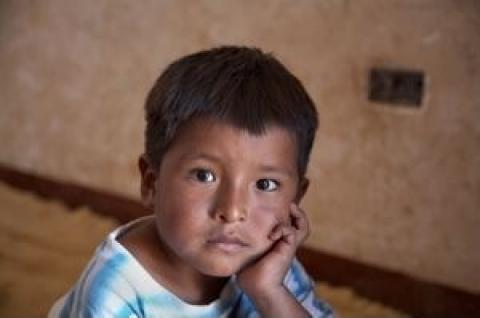
The following reflection was written by Maggie Fogarty, a former Maryknoll lay missioner in Bolivia, and is published in A Maryknoll Liturgical Year: Reflections on the Readings for Year B, available from Orbis Books.
My husband and I and our two young children had been living in Amachuma, Bolivia for about two years when I had an experience that enabled me to recognize what it truly means to be in mission. It was Christmas time, and a local church had organized a Nativity play for the children in our village. Everyone was thrilled. There would be costumes and hot chocolate and the whole village would be there to watch the play.
On the morning of the play, three little boys came to my door. “Hermana,” they said, “we are shepherds in the play, and we need your help for our costumes.”
“What do you need?” I asked them.
“We need the towels we’ve seen drying on your clothes line. We need the big ones for our bodies and the little ones for our heads."
“But Juanito,” I said to the oldest boy, “you are already a shepherd. Every single day, after school, you take your family’s 30 sheep to pasture, and you wait with them to keep them safe from thieves and hungry dogs. And then you bring them home; you give them food and fresh water; and you put them in their shelter for the night.”
And to Carlos I said, “Do you remember one morning last month, when you brought a newborn lamb to my house?” The lamb had been born on a frosty morning, and was freezing to death on the hard ground. Carlos had thought to pick up the lamb, stiff with cold, and run to our house because he had seen us use a portable gas heater in our kitchen. “You saved that little lamb, Carlos. You held it in your arms by our heater until it was warm and kicking to life. That, my friend, makes you a smart and wonderful shepherd.”
Now, I don’t think my words had much impact on these dear ones in that moment, and they probably wondered why I had tears in my eyes. After all, they were taking their acting roles very seriously and they wanted to look like the shepherds they saw in the pictures of their church’s illustrated Bible. And they would feel more appropriately attired in my dish towels and bath towels. So of course, I sent them along, with armloads of towels and a promise that we would be there to take their pictures and applaud for them.
And as we watched the play that night, I knew that if I did nothing else in our time in Bolivia, I would find ways to say to these beautiful children that they are already good enough, that their experiences matter, they know more than they think they know, and they know more than they’ve been told they know. And they don’t need anybody’s dish towels to tell a story about God being born in the world.
There were many times during our years in Bolivia that we were given good news to proclaim. We witnessed indigenous people organizing to demand a more just society and a more dignified economy. We witnessed farmers and mothers, miners and teachers insisting, nonviolently, on political change that would honor their values and identity as a nation of indigenous people. When the people of Bolivia elected an Aymara man, a farmer and union leader, as the country’s first indigenous president, we said to the children of our Aymara village: “Look, a man who looks like you is now president of your country!”
Today’s Gospel tells us about John: “He himself was not the light, but he came to testify to the light.” We missioners, when we open our eyes and our hearts to the presence of God that surrounds us in the communities where we live, are called to be witnesses to the light that we find there.
We proclaim the good news that God is truly among us,
- in the wisdom and resilience and tenacity of the peoples of the world
- who have had to fight to stay alive,
- who are working to reclaim their sacred traditions and language after centuries of conquest,
- who are trying to create security for themselves and their families in the cruel dynamics of the global economy
To be in mission is to find a thousand ways to say, “You are beautiful, you are wise and powerful, your ways are wonderful, you are marvelous just as God made you.” The good news we proclaim is that those we encounter in mission can show us a path to peace and to our shared salvation.
It is good news for all of us.
Photo by Sean Sprague
